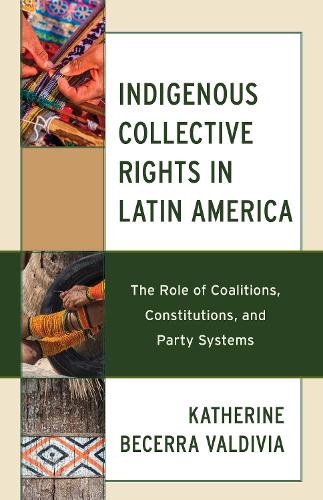
Indigenous Collective Rights in Latin America: The Role of Coalitions, Constitutions, and Party Systems
(Hardback)
Publishing Details
Indigenous Collective Rights in Latin America: The Role of Coalitions, Constitutions, and Party Systems
By (Author) Katherine Becerra Valdivia
Bloomsbury Publishing PLC
Lexington Books/Fortress Academic
23rd September 2022
United States
Classifications
Professional and Scholarly
Non Fiction
Indigenous peoples / Indigeneity
323.18
Physical Properties
Hardback
192
Width 158mm, Height 238mm, Spine 21mm
472g
Description
Latin America is a region with high levels of recognition for indigenous collective rights. Still, legal protections differ considerably among the countries. Why do some countries in Latin America have a strong recognition of collective rights for indigenous people while others do not What are the factors that help enhance the presence of collective rights The author argues that while indigenous social movements are crucial to the protection of indigenous rights, they are not enough. The recognition of these rights is influenced by organizational factors (such as coalitions between indigenous peoples and non-indigenous allies) as well as institutional conditions (including constitutional replacement and party systems). By employing qualitative comparative analysis (QCA) and case studies from Bolivia, Chile, Colombia, Ecuador, Guatemala, Mexico, and Peru, this book explores the ways various elements combine to create conditions for a variety of collective rights.
Reviews
Indigenous Collective Rights in Latin America fills a gap in research. For a long time, the installation of Indigenous collective rights was associated with international pressure or influential Indigenous movements. Katherine Becerra Valdivia disentangles the complex relations behind strong collective rights, including alliances between the Indigenous movements and other actors, the system of political parties, and the constitutional background in Latin America. This is an important step to better understanding why some countries grant strong collective rights to national minorities and others do not, which is relevant globally.
--Philipp Altmann, Central University of EcuadorAuthor Bio
Katherine Becerra Valdivia is assistant professor of law at Universidad Catlica del Norte,
Chile and associate teaching professor at Universidad Central de Chile.
